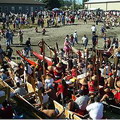 美國西北數個原住民部落與加拿大原住民族(First Nations)2008年和美國地質調查局(USGS)結盟合作,在7月獨木舟橫越沙利旭海(Salish Sea)的傳統活動中,加進科學調查的任務。
美國西北數個原住民部落與加拿大原住民族(First Nations)2008年和美國地質調查局(USGS)結盟合作,在7月獨木舟橫越沙利旭海(Salish Sea)的傳統活動中,加進科學調查的任務。
這項名為「部落旅程」(Tribal Journeys)的年度泛舟活動,今年有約100多艘獨木舟參與,划行穿越卑詩省與華盛頓州之間的內海,其中有5艘將攜帶GPS定位系統與探測儀器,測量海水的溫度、鹽度、酸鹼度、溶氧量、固體溶解量與混濁度等性質。
本次的調查行動得到地質調查局的科學家協助,希望能幫助了解這片部落傳統水域的環境惡化狀況。
斯溫諾密什(Swinomish)部落首領克萊度斯拜(Brian Cladoosby)負責籌劃調查行動,他表示,「過去百年來,我們最神聖的海域被人當成了垃圾場,重金屬、毒物、農業廢水、大範圍污染……水裡統統找得到,全都流進了沙利旭海。」
克萊度斯拜在致詞中強調,「必須讓所有人知道這個情況,這是我們這一代,還有後代子孫的責任。沙利旭海岸部落不願意再看到任何的污染,所以我們決定站出來,一起復育、保護這片珍貴的海域。」
沙利旭海的範圍涵蓋了BC省的喬治亞海峽(Strait of Georgia)、BC省與華盛頓州交界的胡安.德富卡海峽(Strait of Juan de Fuca),以及華盛頓州的普吉灣(Puget Sound)。海岸周圍居住了數個美國原住民部落與加拿大原住民族,統稱為「沙利旭海岸部落」。
根據沙利旭海岸部落的古老傳統,在節日慶典的時候會以泛舟橫渡沙利旭海的方式慶祝,從1989年開始的「部落旅程」獨木舟航行活動,就是為了恢復、紀念這個傳統而舉辦。
今年的部落旅程活動是歷來規模最大的一次,距離最遠的參加者包括阿拉斯加與BC省交界的特里葛(Tligket)隊,以及北方夏洛特女王群島(Queen Charlotte Islands)的海達(Haida)隊,他們從7月8日起陸續出發。南邊也有遠從奧勒岡州北上的隊伍,所有人預計7月28日到達溫哥華島南部的考津灣(Cowichan Bay),結束整段旅程。
眾人在考津會師之後,緊接著在8月2日為今年的北美原住民大賽拉開序幕,賽程將持續到8月10日,有超過7千名運動員與會,在16項競賽項目中一較高下。
但是對美國地質調查局來說,泛舟之旅是慶典中最重要的活動。葛羅斯曼(Eric Grossman)與舒斯特(Paul Schuster)兩位科學家將為調查活動提供科學方面的指導,駐斯溫諾密什部落的科學家愛琴(Sarah Akin)則是計畫主持人。
葛羅斯曼在網路廣播中表示,「很榮幸受到沙利旭海岸部落邀請,幫忙了解沿岸的水質狀況,以及在沙利旭海岸生態區內,影響海洋資源的棲地相關問題。」葛羅斯曼一直進行相關研究,調查普結海峽水質與棲地因為都市化所受到的衝擊 。
葛羅斯曼也表示,地質調查局會指導沙利旭海岸部落族人如何獨立進行測量操作,「如果他們願意,日後就能繼續進行類似的科學調查量測。」
獨木舟既沒有任何污染物排放,也不會擾亂水流,因此非常適合用來從事水質測量。在獨木舟航行活動中加入科學任務的概念,最早由2007年阿拉斯加的育空(Yucon)地區開始嘗試。航程超過1930公里的育空河療癒之旅(Yukon River Healing Journey),原本是為了提倡環境意識與文化交流,但是在地質調查局水文學家舒斯特的指導下,參加人員也幫忙紀錄了沿途的水質狀況。
A canoe trip by American Tribes and Canadian First Nations through the Salish Sea this month will be part tradition and part science under a new partnership between the U.S. Geological Survey and tribes of the region.
Five of some 100 canoes participating in Tribal Journeys, an annual paddle through the inland waters of British Columbia and Washington, will carry Global Positioning System units and probes that measure the quality of the water, including its temperature, salinity, pH, dissolved oxygen, total dissolved solids and turbidity.
Aided by scientists from the USGS, the project aims to get a better handle on environmental degradation of the tribes' ancestral waters.
"Over the last 100 years, people have looked at our most sacred site as a dump site," said Brian Cladoosby, chairman of the Swinomish Tribe, which is coordinating the project. "You have everything - heavy metals, toxins, farm runoff, nonpoint pollution - and it ends up in the Salish Sea. It's up to this generation and future generations to make everyone aware of the conditions," Cladoosby said in a statement. "We as Coast Salish have decided 'no more,' and we are stepping forward to restore and protect our most precious waters."
The Salish Sea encompasses the Strait of Georgia in British Columbia; the Strait of Juan de Fuca that flows between Washington and British Columbia; and Puget Sound in Washington. Coast Salish is the collective name for a number of tribes and First Nations people of the region.
Coast Salish tribes traditionally paddled the Salish Sea to meet for ceremonies and festivals. The Tribal Journeys Canoe Voyage started in 1989 to revive and celebrate the tradition.
This year's Tribal Journeys, billed as the largest yet, begins for its farthest-flung participants on July 8. Tlingket paddlers will come from as far north as the border of Alaska with British Columbia, and Haida paddlers will come from Haida G'wai far to the north, also called the Queen Charlotte Islands.
Paddlers will travel from as far south as Oregon, and all will end their trip at Cowichan Bay on southern Vancouver Island on July 28.
The gathering in Cowichan marks the start of the 2008 North American Indigenous Games, which runs from August 2 to 10 and will involve more than 7,000 athletes competing in 16 sports.
For the U.S. Geological Survey, the journey will be the most important part of the event. Two agency scientists, Eric Grossman and Paul Schuster, are serving as science advisors. Sarah Akin, a scientist with the Swinomish Tribe, is leading the project.
"It was a great honor to be invited by Coast Salish to help identify some of the coastal water quality and habitat problems that are affecting the marine resources of the Coast Salish ecoregion,” Grossman said in a podcast. He has been studying the effects of urbanization on water quality and habitat in the Puget Sound.
Grossman said the USGS will teach Coast Salish participants how to make the measurements independently. "We'll be empowering them to continue this type of science in the future, if they choose,” he said.
Canoes are considered especially suited to the task because they do not discharge pollutants or otherwise disrupt the water.
The concept of adding science missions to canoe voyages was tested last year in Alaska during the Yukon River Healing Journey, a 1,200 mile paddle down the Yukon. The journey's chief goal was to promote environmental awareness and cultural ties, but participants, under the guidance of USGS hydrologist Paul Schuster, also collected water quality measurements along the way.
全文及圖片詳見:ENS






